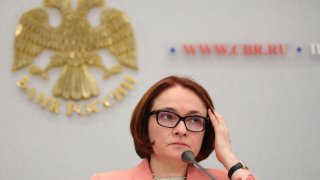
- Central Bank of Russia Governor Elvira Nabiullina on Monday suggested that policymakers "must have the possibility to lower the key rate faster."
- The World Bank has projected that Russian GDP will shrink by 11% this year, while the IMF on Tuesday projected a contraction of 8.5% in 2022 and a further 2.3% in 2023.
Russian central bankers face the difficult task of balancing consumer stockpiling, supply shocks and a predicted slowdown in spending as tough international sanctions try to bring the Russian economy to its knees.
Russian inflation reached an annual 16.7% in March, but the central bank cut its main interest rate from 20% to 17% earlier this month as it looks to mitigate the impact of economic sanctions.
Central Bank of Russia Governor Elvira Nabiullina on Monday suggested that policymakers "must have the possibility to lower the key rate faster," adding that the central bank would not try to rein in inflation by any means necessary as this would prevent businesses from adapting to the new economic environment.
Get a weekly recap of the latest San Francisco Bay Area housing news. Sign up for NBC Bay Area’s Housing Deconstructed newsletter.
The CBR more than doubled its main interest rate from 9.5% to 20% in late February, following Russia's unprovoked invasion of Ukraine, as the country's ruble currency hit a record low amid a barrage of punitive international sanctions.
Despite monthly inflation in March hitting 7.61%, its highest rate since 1999, the central bank appears to be prioritizing supporting the economy through a transitional period as western sanctions, including the freezing of almost half of the CBR's foreign currency reserves, begin to bite.
Nabiullina said Monday that the CBR will aim to bring inflation back toward its 4% target in 2024, but the central bank governor indicated that the fallout from sanctions is beginning to spill over from financial markets to the real economy.
Money Report
The World Bank has projected that Russian GDP will shrink by 11% this year, while the IMF on Tuesday projected a contraction of 8.5% in 2022 and a further 2.3% in 2023. Russian President Vladimir Putin said Monday that the government may need to increase budget spending to boost liquidity and shore up the economy.
In a note last week, Goldman Sachs said that the existing trends in the Russian economy were continuing, but weekly data suggested that inflation was slowing slightly.
"Consumer spending continues to slow and the services PMI in particular weakened significantly and more than the manufacturing one, quite plausibly because Western companies, which have at least temporarily pulled out of Russia, were more engaged in services rather than manufacturing," Goldman Sachs economists said.
"Inflation is slowing but remains high at just under 1% week-on-week, disproportionately driven by households stocking up on non-perishable goods and bringing purchases of consumer durables forward, fearing sanction driven supply disruptions in the future. Judging from the port data, export activity appears to have picked up in the second half of March."
The past week's inflation data is due for publication on Wednesday, but Russian Economy Minister Maxim Reshetnikov told a government meeting on Tuesday that he expects a "significant slowdown" in consumer price increases, according to Reuters.
Along with a shrinking economy, Russia also faces a major default on its foreign debt unless it can return to repaying bondholders in dollars, as agreed under the terms of its loans, by the end of a grace period on May 4, according to ratings agencies Moody's and S&P.
Timothy Ash, senior emerging market sovereign strategist at Bluebay Asset Management, said the 11% contraction projected by the World Bank would mean around a $200 billion hit to the Russian economy, but argued that this would only be the start of the country's economic plight.
"For Russia as long as Putin remains in power, and because of all the war crimes committed in this war and revealed for the world to see, Russia will remain an international pariah for years to come," Ash said.
"It will remain in default on its foreign debts for years to come, isolated from international capital markets, starved of investment, increasingly cut off from international trade and business - cut out of Western energy and commodity supply chains - suffering recession and stagnation, falling living standards and increased capital flight and brain drain."






